- Intellectual
Property TOP - Intellectual Property
Strategy to Support Fujitsu's
Purpose - Intellectual
Property Portfolio - Brands &
Trademarks / Design
& Design Rights - Intellectual Property
Management and
Risk Compliance - International
Standardization
and Rulemaking - Efforts to Utilize
Intellectual Property
for Co-creation - Evaluations from
Third Parties
Talk Session
AI Technologies and Intellectual-Property Activities to Improve Society

An online discussion was held to discuss the development of AI technologies and intellectual-property activities to improve society, starting from Fujitsu's purpose, with key persons in AI technologies, persons in charge of intellectual property in AI technologies, and persons in charge of intellectual property strategy formulation in Fujitsu.
MEMBERS
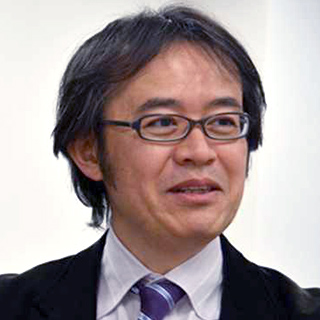
Hirokazu Anai
Fujitsu Research Institute, Inc.
Artificial Intelligence LaboratoryResponsible for the research and development of cutting edge technologies, advanced AI technologies, and solutions to social issues using AI and mathematical technologies.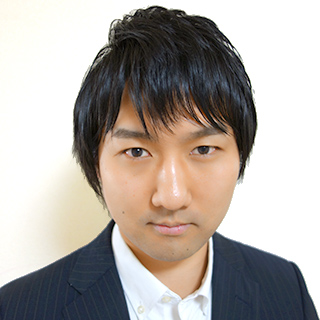
Shinichiro Suzuki
Fujitsu Limited
Intellectual Property CenterSince joining the company, he has been in charge of intellectual property rights and patent prosecution mainly for software and solutions and is currently in charge of patent prosecution for AI. Since 2020, he has been working as the Intellectual Property Technology Meister for AI technologies.
Hiroyuki Kaneko
Fujitsu Limited
Intellectual Property Strategy Planning Dept.Responsible for the formulation and promotion of company-wide intellectual property strategies, and in particular, for initiatives to utilize intellectual property to resolve social issues.
Beyond the power of technology
While we are engaged in AI research, technology development, and social implementation, our aim is to put technologies into the world. I believe that it is very important to consider how to use them as an intellectual property strategy; that is, how to use them as weapons amid the changing world situation. I'd like to discuss that.
We look forward to hearing your opinions on our activities based on your abundant experience. Mr. Suzuki, what is the role of the Intellectual Property Technology Meister? Including that, please introduce yourself.
Since I joined the company, I have been in charge of patent prosecution for the software and solutions divisions, and I am now mainly in charge of the AI field. One of the characteristics of Fujitsu's intellectual property managers is that they are connected to both the R&D and business divisions. The term "Technology Meister" implies that we will be able to use our characteristics to understand each person's thoughts, perspectives, and issues; to understand the value of technology and why it is necessary for the present and future of Fujitsu; and to propose and implement optimal intellectual property strategies based on that understanding. From the perspective of whether or not AI technologies will be accepted by society, we hope to win the trust of customers and society with regard to Fujitsu's AI technologies through obtaining patent rights and to contribute to sound innovation in the world. It's actually my first time talking to you, so I'm looking forward to it.
Finally, I am Kaneko, the host. I am involved in the formulation of the company-wide intellectual property strategy. I am looking forward to hearing from both of you since you are involved in this area both inside and outside the company, mainly in solving social issues and in the use of and initiatives for intellectual property to improve society.
Challenges for improving society through AI technologies
First, Mr. Anai will introduce Fujitsu's efforts for AI technologies to improve society.
At present, Fujitsu is working on a purpose-driven system, of "We will bring trust to society through innovation and make the world more sustainable." Our vision is to move toward this purpose and to change society through developing technologies. It feels natural to be heading in the direction of being purpose origin, purpose-driven. As a researcher myself, I have been working on cutting-edge technologies, of advanced AI technologies, which are closely related to core research and mathematics. Cutting-edge AI technologies enable us to do things that we couldn't do before. They are capable of great precision and efficiency and can surpass people. These technologies create new value.
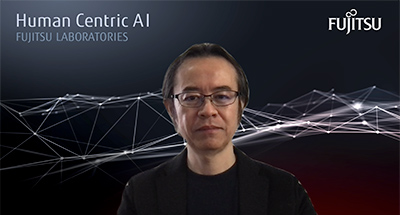 Fujitsu Research Institute, Inc.
Fujitsu Research Institute, Inc.
Artificial Intelligence Laboratory
Hirokazu Anai
How they contribute to social change, personal experiences, and happiness, and how they contribute to improving industrial productivity, are the difficulties that cannot be easily connected when we are technology driven.
On the other hand, AI has been implemented in various places since the third AI boom. There is a trend for user companies to do their own work, and the second layer of the diagram, "Providing trusted AI," is a challenge that has become apparent as this trend expands. AI is causing social problems.
One is AI ethics, and we don't know why black-boxed AI is causing it. How do you think about accountability and responsibility for this? Another is the viewpoint of operation and quality. AI, especially machine learning, is rooted in probability and statistics, and in order to control it well, it has to be secured by operation and quality and it has to think about data, security, and other things that are different from conventional IT systems. We are conducting research from two major perspectives of how to ensure reliability and to create a society that can be used with peace of mind in the world.
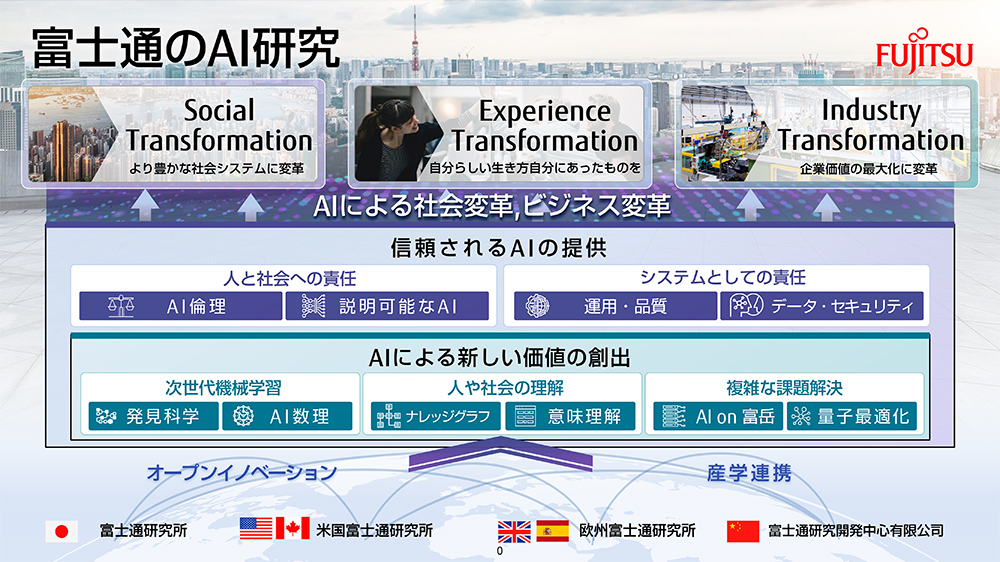
Here are a few examples of how AI is moving into social change, experience change, and industry change.
In the midst of social reforms, we are working to address social issues such as disaster risk reduction, to contribute to disaster risk reduction without causing disaster victims or other victims in disaster-prone countries, on cybersecurity, and to ensure safety and security in the face of malicious attacks. In the area of medical care, we have been able to conduct genome medical diagnoses in 30 million papers, and we are contributing to the health of everyone.
Amid the transformation of industry also, it has also increased corporate value by increasing delivery and yield, and by introducing image recognition AI into register-less services.
In terms of a current issue, for example in AI ethics, when AI makes discriminatory judgments, it may lead to the promotion of minority discrimination.
Fujitsu Laboratories and Fujitsu are actively participating in the formulation and standardization of rules. While participating in and leading the organization, we are working hard to develop our own AI commitments and to establish external committees.
On the other hand, from the viewpoint of operation and quality, there are difficulties unique to AI in terms of how to ensure the quality and use of things containing AI. Through technologies, on considering the possibility that accuracy may decline, we are working to develop technologies that can cover operations while maintaining accuracy and conducting activities that can be incorporated into the development process.
How can we create AI that is trusted by society and create a world in which we can enjoy the profits and benefits of AI? Social issues are the target, and in order to make people happy, I think what is important is how technology is created and how to connect to the exit.
For example, in the disaster prevention mentioned earlier, we will be able to solve problems by using AI to learn how to escape by looking at the simulation results of a tsunami simulation and image person recognition on Fugaku. I think the key to solving social issues is how to integrate technologies and to create value. In addition, we are researching and developing solutions for various conferences by reading facial expressions from video images to understand how to understand and empathize in a divided environment, such as remote work, and by recognizing the states of mind and whether or not a person is concentrating from their facial expressions and movements.
Technologies can create value, but we are committed to contributing to society through trusted AI.
Improving the reliability and quality of AI technologies
In general, AI is attracting attention as a great technology, and I think there is a recognition that AI can do anything. One of the difficulties is that there is a gap between customers and AI developers. That's why I feel that we are focusing on operation and quality that make it easier to use.
If you don't have a deep understanding of AI, why does that happen, why do you have to do it, why do you need to relearn, these things that are supposed to be more accurate but that have been OK so far are said to be bad, people cannot understand that things will change, and so on. We need an explanation for this. Since it takes time for both companies to understand each other, the advantage of Fujitsu's AI technology is that it covers everything with the technology without any stress and is made in the operation and development process. I think that the ability to provide reliable AI could be one of the major pillars toward realizing the purpose.
I have the impression that the reliability of AI is something we often hear about recently. Other companies have also made announcements on AI ethics. In this regard, the history of AI research has entered a winter period many times, but has reliability been a problem for a long time?
It is said that this is the third boom of AI. I think the reliability problem was already recognized at the time of the second AI boom, but since AI at that time was based on rules and knowledge, the black box problem hardly occurred. Now that we have a lot of data and computational power, we can take advantage of machine learning and deep learning for the first time. Because of this trend, this is becoming important.
You talked about understanding and the penetration of this understanding in the world. Are there any announcements because other companies have the same understanding?
We have been working on AI ethics on a global basis, but other companies have also stepped in to conduct audits of all products and other specific activities.
If that happens, we will be able to differentiate ourselves from other companies and we will have to work together. I understood that we have to think about it strategically. Are you currently working with other companies?
Other companies also participate in ethical organizations. We are also working on standardization. Some parts move together. However, as one part of Fujitsu's AI ethics, we have already started to move forward, and I think how we will proceed in the future will also be important for Fujitsu.
The role of intellectual property in advancing AI technology
What aspects of R&D and social implementation do you find difficult as a researcher when working with other companies?
First, there is a data problem. If you receive data from other companies and study it, you will have a learned model. What will happen to the rights of the learned model, and where and to what extent will the rights be? If you get the parameters of a learned model and you can implement the data, it's the same as getting the data. The question is how to explain and prove it.
When you work on R&D with other companies, do patents come up?
Patent applications and publications are often discussed. But you might have to think about whether it's enough to just create a technology and patent it. Within a company, issuing patents is a basic stance, but from the viewpoint of researchers, the evaluation of the number of papers is more important than that of the number of patents. This is true not only in academia, but also in advanced AI talent and for people in venture companies and other companies. This is directly related to the recruitment of highly skilled AI personnel. You can get a job with a big annual salary. A paper, not a patent, is an indicator of the power of AI in a person's technical capabilities. It's a hot topic because it involves hiring highly skilled AI talent.
In the first place, there is an exclusive element in patent rights, but the direction is changing in the process of openness and co-creation. I don't know if it's a trust in technology, but the Intellectual Property Division believes that patents can be used as entry tickets for co-creation or as an opportunity for others to learn about Fujitsu. We are looking for ways to evaluate the capabilities of researchers, such as their individual capabilities, abundant experience, and wide range of knowledge, by using patents.
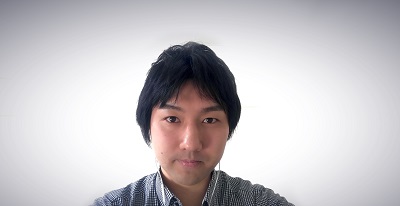 Fujitsu Limited Intellectual Property Center
Fujitsu Limited Intellectual Property Center
Shinichiro Suzuki
We will apply for patents from the joint research. Patents also provide a framework to support the teacher's results. In that sense, they serve as a proof of capability. I think it would be a good idea to use patents as evidence to show that there are important technologies that cannot be published in papers. At a top conference, you will be asked to submit a program along with your paper. It is necessary to consider whether to make it intellectual property or open, and when providing a technology, it is necessary that the technology must be devised from this. The technology can be patented. It is not the core of the research, but it is necessary for practical research. This is what intellectual property should be.
Patent applications that improve the reliability of AI technology
Does applying for an AI-related patent increase the presence of Fujitsu researchers, make people aware that it has researchers with capabilities, and lead to trust in Fujitsu?
I think that communicating values will contribute to researchers and to solving social issues.
What do you think about increasing the reliability of AI technology from the aspect of patents?
Acquiring patents of trusted AI that algorithmically show that there is no bias in quality assurance, governance, or ethics may be useful in terms of presence. That is difficult for a thesis.
The point for patents is not only to attack, but also to protect society. It is important for Fujitsu to secure patents on reliability, remove them from bad things, and bring about social stability. I think there might be an approach to not only close but also to accommodate each other in the community.
You're right. When it comes to open source software, it is sometimes said that patents are unnecessary. However, there are people who are not part of the OSS community who do not necessarily have an agreement within the community. So I don't think it's a simple case of not having a patent because the community doesn't exercise the right. We believe that the application is not wasteful in the sense that we secure and control patents ourselves in order to enhance the safety of the community. In this talk, unlike in a paper, you mentioned that the idea and concept of the implementation becomes a patent, and I felt that the power of this has value.
I understood that the purpose of issuing patents is to show the presence of developers, which in turn leads to trust being placed in Fujitsu and a presence that leads to the existence of technological capabilities. I also understood that intellectual property has a role to play in securing rights and ensuring the stability of the community as a mission, whether it is an open community or a technology opening.
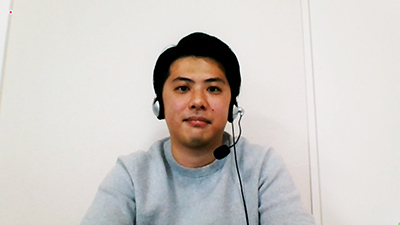 Fujitsu Limited Intellectual Property Strategy Planning Dept.
Fujitsu Limited Intellectual Property Strategy Planning Dept.
Hiroyuki Kaneko
Working Together on Technologies and Intellectual Property Strategies
There are many co-authors of an S rank paper. The technologies will not spread unless such a co-creation type, curve-out mechanism is arranged or a venture is formed. Technology alone has its limits in solving social issues. When co-creation partners and customers respect each other and work with each other, intellectual property and patents become something like entry tickets at that time. It constitutes a foundation for thinking positively, collaborating and creating mutual value.
I would like us to consider intellectual property, such as making patents more accessible to the public. As an opportunity to join together, I would like to think about how I can be of use in terms of intellectual property.
Isn't it important to think together? From the perspective of technology, we can't cut off our intellectual property in terms of how we can connect them to our purpose to solve social issues. After all, it is important for us to show our resolve by having intellectual property and creating strategies that lead to sustainability and being able to achieve sustainability.
As far as I'm concerned, this issue is open-closed. What has been closed is opened. To put it simply, there are various ways to work with this technology, such as opening it, closing it, and forming a venture on closing it all. It's about strategy. I expect that intellectual property will be the most important entry ticket in terms of how to use intellectual property in such a way that the technology spreads and connects to society. I think it is important that we walk together.
I'd love to do this. The idea of intellectual property alone is often wrong. It can be difficult to think together, but if you don't think together, you won't find a good answer. As a person in charge, I am worried that intellectual property is considered to be a difficult field to approach, so I appreciate you asking me.
After the talk session
Thank you very much. I'm relieved to hear that we will do our best. Would you say one last thing, please?
It's embarrassing, but there were many things I didn't know about and I have learned a lot. After all, technologies and patents are linked in many ways. I also hope that both of them will eventually be useful. I hope we can create something good based on common ground. I want to do my best to realize this. Thank you very much.
It was very helpful to think about intellectual property. Rather than intellectual property in the future, from the perspective of our technologies, intellectual property is inseparable from them in terms of how we can resolve social issues and connect them to our purpose. Don't just be open. I believe that having intellectual property will lead to sustainability. It is important to develop intellectual properties and to disseminate them with thought, and to make strategies sustainable. I realized again today that the idea of intellectual property is essential. Thank you for a very enjoyable time.
This concludes the conversation. Thank you very much.
Conducted on March 3, 2021
The titles, numerical values, proper nouns, etc., described in this article are those at the time of the interview.
- Fujitsu's Intellectual Property
- Intellectual Property Strategy to Support Fujitsu's Purpose
- Intellectual Property Portfolio
- Brands & Trademarks / Design & Design Rights
- Intellectual Property Management and Risk Compliance
- International Standardization and Rulemaking
- Efforts to Utilize Intellectual Property for Co-creation
- Evaluations from Third Parties

Fujitsu's AI technologies, the quality of its patents, and its number of patents are described on its intellectual property page. I would like to speak with Mr. Anai, a key person in AI technology at Fujitsu, and Mr. Suzuki, the Intellectual Property Technology Meister in the Intellectual Property Division, about the issues in AI technologies, what kind of intellectual-property activities should be carried out to link AI technologies to solving social issues, and their thoughts on society beyond the greatness of technology. First of all, please say a few words, including on your expectations for today.